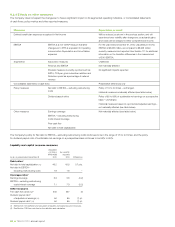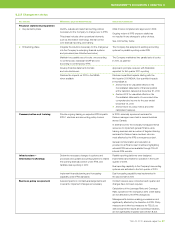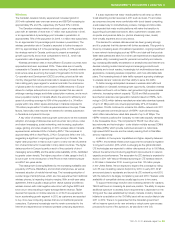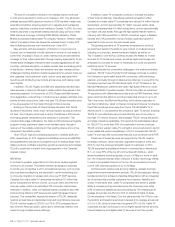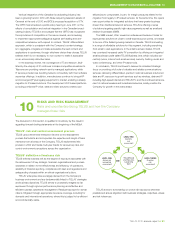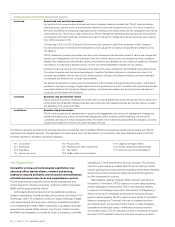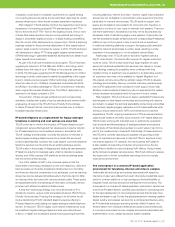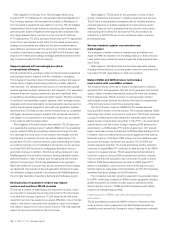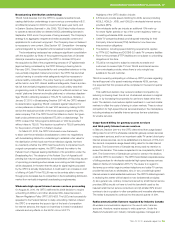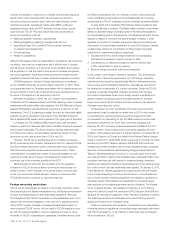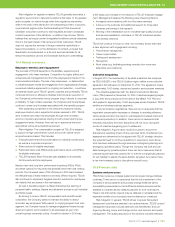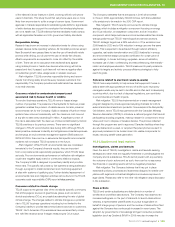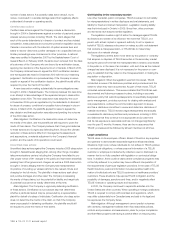Telus 2010 Annual Report Download - page 100
Download and view the complete annual report
Please find page 100 of the 2010 Telus annual report below. You can navigate through the pages in the report by either clicking on the pages listed below, or by using the keyword search tool below to find specific information within the annual report.96 . TELUS 2010 annual report
Risk mitigation: TELUS plans for this possibility in terms of future
growth, maintenance and support of existing equipment and services.
TELUS has a comprehensive contingency plan for multiple scenarios,
including exposure to multiple suppliers and ongoing strong vendor
relations. There can be no guarantee that the outcome of any vendor
restructuring will not affect the services that TELUS provides to its
customers, or that TELUS will not incur additional costs to continue
providing services.
Wireless handset supplier concentration and
market power
The popularity of certain models of smartphones and tablets from
Apple and RIM has resulted in an increasing reliance on these manufac-
turers, which may increase the market power that these suppliers have
over TELUS.
Risk mitigation: TELUS provides and promotes alternative devices,
including Android devices, to provide greater choice for consumers and
help lessen TELUS’ dependence on a few key suppliers.
Mature CDMA and iDEN wireless technologies
must coexist with new HSPA+ network
The wireless industry continues to expand the deployment of second
generation (2G), third generation (3G) and fourth generation (4G) technol-
ogies to deliver increased data speeds required for many new wireless,
IP and data services. TELUS’ evolution to next generation wireless
technologies involves services and devices that meet the requirements
of the Company’s current and future subscriber base.
TELUS continues to support CDMA2000 3G wireless services,
including EVDO revision A (DOrA) services. The Company believes CDMA
technology will continue to be used for some time. TELUS also continues
to support its Mike service that remains the Canadian leader with the
largest number of subscribers using Push to Talk (PTT). U.S. carrier Sprint
recently announced that it plans to begin migrating iDEN services and
subscribers to a CDMA-based PTT solution beginning in 2011 and will
begin a multi-year process to phase out its iDEN cell sites starting in 2013.
In addition, Sprint and Motorola announced an agreement that extends
Motorola’s support of the Sprint iDEN network for three additional years
and covers the supply of software and services. TELUS’ iDEN sub-
scribers represent less than 7% of total subscribers and the Company
continues to migrate Mike PTT customers to data devices on its HSPA+
network in a targeted manner. TELUS expects Nextel International to
continue to support a strong iDEN ecosystem and services. However,
there is a risk that this ecosystem may not provide the scale to ensure
sufficient iDEN device development, and that an HSPA-based PTT
platform comparable in performance to that of iDEN may not be suf-
ficiently mature for wide-scale commercialization by TELUS in the same
timeframe that Sprint phases out its iDEN network.
The Company’s near-term growth is expected to be propelled mainly
by HSPA+ technology, because of HSPA’s broader geographic adoption,
greater anticipated economies of scale, superior speeds and wider
device selection. As such, CDMA and iDEN coexistence with HSPA+
needs to be managed appropriately.
Implementation of HSPA+ and other 4G network technologies
and systems
TELUS successfully launched its HSPA+ network in November 2009,
under a network sharing agreement with Bell Canada that sped up
completion and reduced the Company’s costs of deployment nationally.
Risk mitigation: In February 2010, TELUS began transitioning
its previous IP TV middleware to next generation Microsoft Mediaroom.
The Company expects it will complete the transition to Mediaroom in
2011 and plans to expand the new platform over time. TELUS mitigates
implementation risk through modular architectures, lab investments,
partnering with system integrators where appropriate, employee trials,
and using hardware that is common to most other North American
IP TV deployments. TELUS is striving to ensure that its IP TV deployment
is part of an open framework that will fit into the overall transformation
strategy once standards are ratified and the actual implementations
have stabilized, particularly with the set-top box. TELUS is also active in
a number of standards bodies such as the MEF and IP Sphere to help
ensure its IP infrastructure strategy leverages standards-based function-
ality to further simplify the TELUS networks.
Support systems will increasingly be critical
to operational efficiency
TELUS currently has a very large number of interconnected operational
and business support systems, and the complexity is increasing.
This is typical of incumbent telecommunications providers that support
a wide variety of legacy and emerging telephony, mobility, data and
video services. The development and launch of a new service typically
requires significant systems development and integration. The associated
developmental and ongoing operational costs are a significant factor
in maintaining competitive position and profit margins. TELUS is proactive
in evolving to next generation support systems, which leverage industry
integration and process standards. As next generation services are intro-
duced, they should be designed to work with next generation systems
frameworks and IT infrastructures, and at the same time, be compatible
with legacy services and support systems. This introduces uncertainty
with respect to the development and regression test costs, and delivery
of the solutions with the desired effect.
Risk mitigation: In line with industry best practice, TELUS’ approach
is to separate the business support systems (BSS) from the operational
support systems (OSS) and underlying network technology. The aim
is to decouple the introduction of new network technologies from the
services sold to customers so both can evolve independently. This
should allow TELUS to optimize network costs while limiting the impact
on customer services, and to facilitate the introduction of new services
by driving BSS/OSS functions by configurable data rather than pro-
grammatic changes. In addition, TELUS is an active participant in the
TeleManagement Forum that is working to develop standard industry-
defined modules in order to reduce cost through scale and increase
adoption through scope. TELUS has established a next generation
BSS/OSS framework to ensure that, as new services and technologies
are developed, they are part of the next generation framework to ease
the retirement of legacy systems in accordance with TeleManagement
Forum’s Next Generation Operations Systems and Software program.
Restructuring of equipment vendors may impact
services and solutions TELUS provides
TELUS has a number of relationships with equipment vendors, which
are important to supplying the services and solutions TELUS provides
to its retail and business customers. TELUS faces the risk that some
equipment vendors may experience business difficulties, may not remain
viable or may have to restructure their operations, which could impact
their ability to support all of their products in future. This may negatively
impact the services and solutions TELUS provides.


